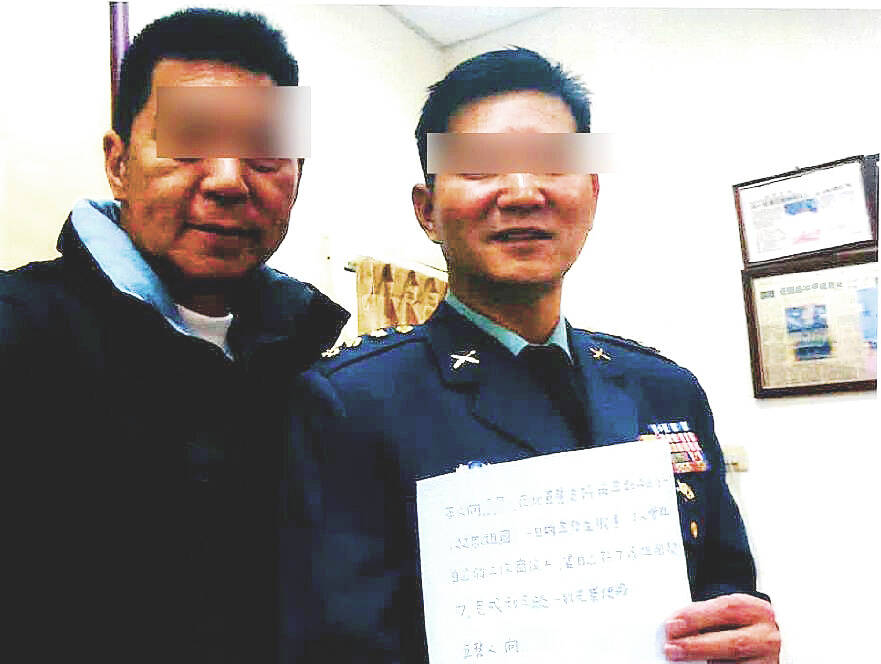The Kaohsiung District Prosecutors’ Office yesterday charged army Colonel Hsiang Te-en (向德恩) with corruption, accusing him of pledging allegiance to China and receiving payment from Chinese operatives to work as a spy.
Prosecutors asked a court to sentence Hsiang to 12 years in prison.
Hsiang is head of the Kaohsiung-based Army Infantry Training Command’s Operations Research and Development Division.

Photo: Copied by Huang Chia-lin, Taipei Times
He allegedly signed a “pledge of surrender” and promised to “serve, as best he may, in his office for the benefits of the motherland in the event of war across the [Taiwan] Strait,” the office said.
Hsiang could not be charged with contraventions of Article 2 of the National Security Act (國家安全法) or treason under the Criminal Code, because evidence had been removed from the cellphones of those implicated, it said.
Hsiang, 49, was recruited by Shao Wei-chiang (邵維強) to work as a Chinese spy, the indictment said.
Shao is a retired lieutenant who had until June 2019 worked as a Kinmen regional reporter for China Television. He also claimed to be a director at Want Want China Times Media Group’s (旺旺中時集團) Times International Advertising Co (時際創意傳媒), president of Kinmen County’s Cross-Strait Cultural and Economic Tourism Development Association, and the owner of a travel agency, the indictment said.
Shao learned in 2005 that his travel agency employed a woman named Yu (尤), whose then-husband, Hsiang, was in the military and began to make overtures to win Hsiang over, the indictment said.
Yu and Hsiang divorced in June 2018.
Shao treated Hsiang to banquets and gifts, and told Hsiang that he was a distant relative of late Chinese People’s Liberation Army general Xiang Shouzhi (向守志), the indictment said.
In January 2020, Hsiang donned his military uniform and made a video, stating: “I, Hsiang Te-en, here do pledge that I support the peaceful unification of both sides of the [Taiwan] Strait. I will serve the motherland and the organization, to the best of my abilities, while remaining in my current position, to ensure the holy and honorable mission of ushering in peaceful reunification as early as possible,” the indictment said.
Hsiang received NT$40,000 a month for working as a spy, totaling NT$560,000 over 14 months, it said.
When he was being led out of an army base on Sept. 26, Hsiang said that he had signed the pledge after seeing other senior officers making similar pledges, the indictment said.
Hsiang has denied the corruption charges.
Implicated military personnel are being investigated by the Ministry of National Defense, the office said.
The ministry said that its Political Warfare Bureau is looking into other military officials who might be involved.
The incident highlights the threat that Chinese intelligence operations pose to the military, the ministry said, adding that its preventive measures are effective.
The ministry will continue to bolster counterespionage education for officers, as well as rank-and-file soldiers, it said.
The ministry would also work closely with national security agencies to thwart Chinese intelligence-gathering efforts, it added.

INVESTIGATION: The case is the latest instance of a DPP figure being implicated in an espionage network accused of allegedly leaking information to Chinese intelligence Democratic Progressive Party (DPP) member Ho Jen-chieh (何仁傑) was detained and held incommunicado yesterday on suspicion of spying for China during his tenure as assistant to then-minister of foreign affairs Joseph Wu (吳釗燮). The Taipei District Prosecutors’ Office said Ho was implicated during its investigation into alleged spying activities by former Presidential Office consultant Wu Shang-yu (吳尚雨). Prosecutors said there is reason to believe Ho breached the National Security Act (國家安全法) by leaking classified Ministry of Foreign Affairs information to Chinese intelligence. Following interrogation, prosecutors petitioned the Taipei District Court to detain Ho, citing concerns over potential collusion or tampering of evidence. The

Seventy percent of middle and elementary schools now conduct English classes entirely in English, the Ministry of Education said, as it encourages schools nationwide to adopt this practice Minister of Education (MOE) Cheng Ying-yao (鄭英耀) is scheduled to present a report on the government’s bilingual education policy to the Legislative Yuan’s Education and Culture Committee today. The report would outline strategies aimed at expanding access to education, reducing regional disparities and improving talent cultivation. Implementation of bilingual education policies has varied across local governments, occasionally drawing public criticism. For example, some schools have required teachers of non-English subjects to pass English proficiency

‘FORM OF PROTEST’: The German Institute Taipei said it was ‘shocked’ to see Nazi symbolism used in connection with political aims as it condemned the incident Sung Chien-liang (宋建樑), who led efforts to recall Democratic Progressive Party (DPP) Legislator Lee Kun-cheng (李坤城), was released on bail of NT$80,000 yesterday amid an outcry over a Nazi armband he wore to questioning the night before. Sung arrived at the New Taipei City District Prosecutors’ Office for questioning in a recall petition forgery case on Tuesday night wearing a red armband bearing a swastika, carrying a copy of Adolf Hitler’s Mein Kampf and giving a Nazi salute. Sung left the building at 1:15am without the armband and apparently covering the book with a coat. This is a serious international scandal and Chinese

TRADE: The premier pledged safeguards on ‘Made in Taiwan’ labeling, anti-dumping measures and stricter export controls to strengthen its position in trade talks Products labeled “made in Taiwan” must be genuinely made in Taiwan, Premier Cho Jung-tai (卓榮泰) said yesterday, vowing to enforce strict safeguards against “origin laundering” and initiate anti-dumping investigations to prevent China dumping its products in Taiwan. Cho made the remarks in a discussion session with representatives from industries in Kaohsiung. In response to the US government’s recent announcement of “reciprocal” tariffs on its trading partners, President William Lai (賴清德) and Cho last week began a series of consultations with industry leaders nationwide to gather feedback and address concerns. Taiwanese and US officials held a videoconference on Friday evening to discuss the